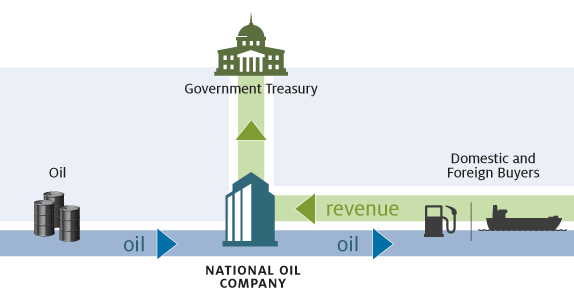
Selling the Citizens' Oil
The sale of crude oil by national oil companies (NOCs) generates a large share of government revenue in oil-producing countries. NOC export sales bring in more than two-thirds of total government income in countries such as Angola, Azerbaijan, Congo-Brazzaville, Iraq, Saudi Arabia and Yemen. Even in Mexico and Norway—both oil countries with diversified economies—export sales equal around 15 percent of the national budget. At this scale, inefficient operations, manipulations of process or the unauthorized retention of funds by an NOC can reduce the resources available for public goods and services.
Revenue Watch researched how 11 countries sell the portion of oil produced that belongs to the government. The results are detailed in four policy briefs that recommend transparency, identify good sale practices and explain how oil sales and global oil prices work.
Many NOCs excel at their sale functions. However, as high oil prices further raise the stakes, presenting the opportunity for windfalls that could stimulate development in producing countries, now is the time to institute checks and balances that ensure transparency and good practices. Especially for developing countries with weak institutions, transparency and governance reforms can help ensure that NOC oil sales advance the long-term public interest.
This research was published simultaneously with the English edition of Commodities: Switzerland’s Most Dangerous Business, by the Berne Declaration. To learn more about the book and download a copy, go to www.evb.ch/en/commodities.

-
The Case for Transparency in National Oil Company Crude Sales (pdf)
Recommends full disclosure of oil sale transactions by NOCs and the companies that buy the oil, including the mandatory inclusion of these transactions in the Extractive Industries Transparency Initiative (EITI). -
The Governance of Oil Sales: Early Lessons on Good Practice (pdf)
Identifies four crucial practices common to successful NOC oil sale systems, and how they enable the nation to capture best value for their crude while limiting opportunities for corruption. -
How Governments Sell their Oil (pdf)
Provides a primer on how the various stages of NOC oil sales work. -
When the Price Is Right (pdf)
Explains how global oil prices and the prices of specific grades of crude are identified and why they change over time.
Illustration by Designlounge
Authors

Alexandra Gillies
Contributor